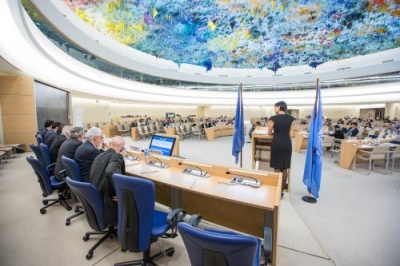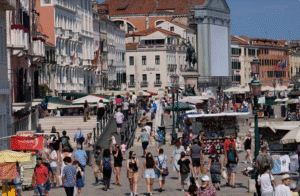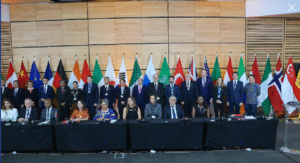World tourism on new journey towards 2030 agenda for sustainable development

TravelBizNews —
Madrid ( UNWTO ) : Participants from around the world joined the official closing ceremony of the International Year of Sustainable Tourism for Development 2017 at the Palace of Nations, in Geneva, Switzerland recently.
The event reviewed the year´s main achievements and discussed the roadmap for advancing the contribution of tourism towards the 2030 Agenda for Sustainable Development.
“2017, the International Year of Sustainable Tourism for Development, has been a unique opportunity for all of us to come together to promote the contribution of tourism to shape a better future for people and planet and to contribute to making this world a better place.“ said UNWTO Secretary General, Taleb Rifai .
“Sustainability remains the bedrock of our activity. We will continue to drive the conversation on planning for and managing tourism growth, define a sector-wide response to climate change, work on how the sector can reduce illegal trade in wildlife and contribute to inclusive job creation” said Gloria Guevara, President and CEO, World Travel & Tourism Council (WTTC).
“It is so important that we succeed in making tourism sustainable by making sustainable tourism economically viable, culturally accepted, and universally practiced.” said Michael Møller, Director General, United Nations Office at Geneva (UNOG). “The United Nations World Tourism Organization deserves great credit for tackling this head on throughout this past year.” he added.
“I personally believe that the future of tourism lies in enabling ICT capacities. Accordingly, we should harness those powers for smart tourism… I believe that the way forward in our journey to 2030, is smart tourism. I call on all of you to guide me and support me in this endeavor” said Talal Abu-Ghazaleh, Chairman, Talal Abu-Ghazaleh Organization in Jordan.
”In the future, a strong international cooperation of all relevant actors involved in the tourism sector should become the driving force to promote sustainable tourism and to implement tourism policies efficiently” said Marie-Gabrielle Ineichen-Fleisch, State Secretary Economic Affairs (SECO) of Switzerland.
Addressing the event was also HM King Simeon II, Special Ambassador of the IY2017 who stressed the importance of public/private partnerships for sustainable tourism.
The panel discussions counted with the participation of the Ministers of Tourism of Costa Rica, Mauricio Ventura, Jamaica, Edmund Bartlett and Kenya, Najib Balala alongside representatives of IY2017 partners such All Nippon Airways, Amadeus, the Balearic Islands Tourism Agency, ECPAT International, the Institute for Tourism and Leisure, HTW Chur University in Switzerland, Minube, Myclimate, PRMEDIACO and the Ras Al Khaimah Tourism Development Authority in the United Arab Emirates.
As part of the legacy of the IY2017, UNWTO presented the results of the ‘Tourism and SDGs’ Report developed in collaboration with the United Nations Development Programme (UNDP). The report which looks into the links between tourism and the SDGs in national policies as well as private sector strategies shows the relevance for the sector of Goals 1 (No Poverty), 4 (Quality Education), 8 (Decent Work and Economic Growth), 11 (Sustainable Cities and Communities), 12 (Responsible Consumption and Production), 13 (Climate Action), 14 (Life Below Water) and 17 (Partnerships for the Goals).
On the occasion, UNWTO launched the Tourism and the Sustainable Development Goals Programme as a legacy of the International Year of Sustainable Tourism for Development 2017. The Programme aims at advocating for the contribution of sustainable tourism´s to the 17 SDGs and encouraging the full integration of tourism and the SDGs in national, regional and global agendas. It includes the future ‘Tourism and SDGs’ online platform – a co-creation space to inspire and empower the tourism sector to act – developed by UNWTO with the support of SECO and an Ambassadors Initiative.
The Tourism and SDGs Ambassadors designated on the occasion include Shaikha Mai bint Mohammed Al Khalifa, President of Bahrain Authority for Culture and Antiquities, the President of Costa Rica, Luis Guillermo Solís, . Huayong Ge, President of UnionPay China; Dr Talal Abu Ghazaleh, Chairman of the Talal Abu-Ghazaleh Organization and Dr Michael Frenzel, President of the Federal Association of the German Tourism Industry.
Dec. 2017














